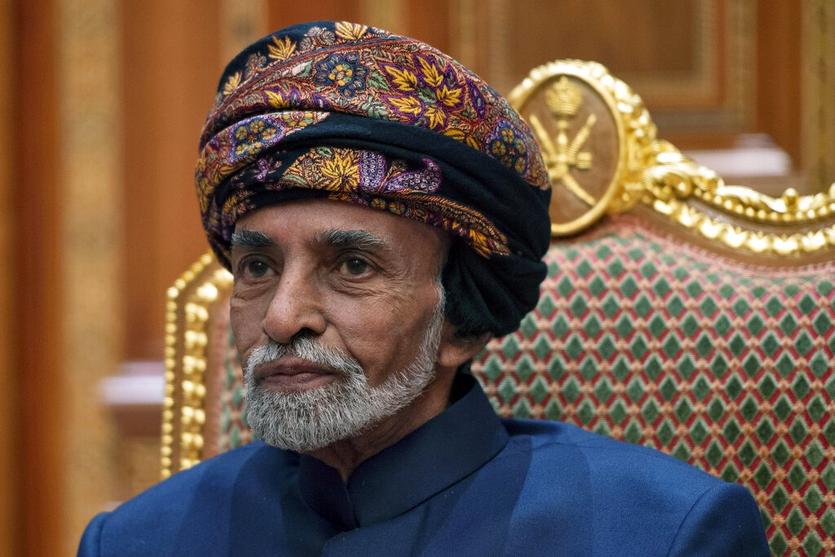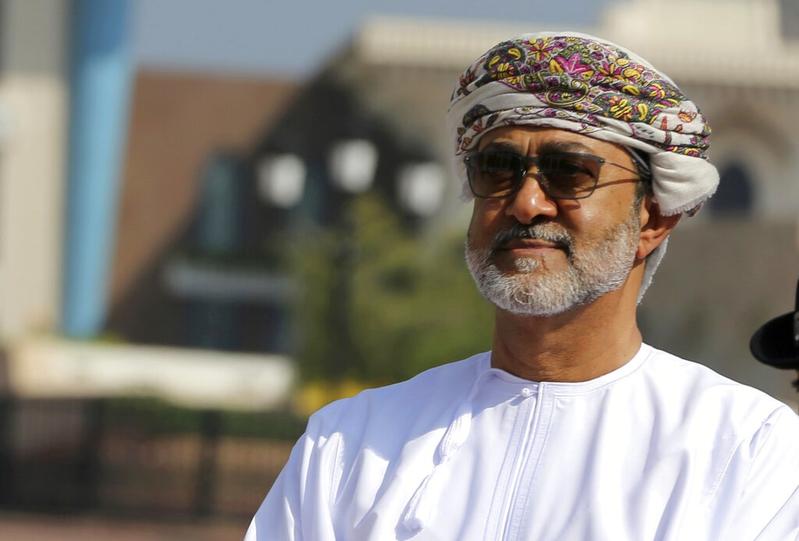 In this Jan 14, 2019 file photo, Sultan of Oman Qaboos bin Said sits during a meeting with US Secretary of State Mike Pompeo (not in frame) at the Beit Al Baraka Royal Palace in Muscat, Oman. (ANDREW CABALLERO-REYNOLDS / POOL PHOTO VIA AP)
In this Jan 14, 2019 file photo, Sultan of Oman Qaboos bin Said sits during a meeting with US Secretary of State Mike Pompeo (not in frame) at the Beit Al Baraka Royal Palace in Muscat, Oman. (ANDREW CABALLERO-REYNOLDS / POOL PHOTO VIA AP)
DUBAI - Oman's Sultan Qaboos bin Said, one of the Middle East's longest-serving rulers who maintained the country's neutrality in regional struggles, died on Friday and his cousin Haitham bin Tariq al-Said was named as his successor in a smooth transition.
With his death, the region loses a trusted and seasoned leader who managed to balance ties between two neighbors locked in a regional struggle, Saudi Arabia to the west and Iran to the north, as well as the United States.
ALSO READ: China, Oman establish strategic partnership
In a televised speech, bin Tariq al-Said promised to uphold Muscat's policy of peaceful coexistence and friendly relations with all nations while further developing Oman. "We will continue to assist in resolving disputes peacefully," he said.
Oman News Agency said the sultan died after "a wise and triumphant march rich with generosity that embraced Oman and extended to the Arab, Muslim and entire world and achieved a balanced policy that the whole world respected"
Oman and fellow Gulf states declared three days of official mourning with flags to be flown at half-mast for bin Said, 79, who ruled since taking over in a bloodless coup in 1970.
State television broadcast images of the funeral procession driving down Sultan bin Said street in Muscat amid tight security as Omanis thronged the palm tree-lined road, some reaching out their hands and others taking pictures.
The casket, draped in the Omani flag, was carried into the Grand Mosque where hundreds of people joined prayers inside. Bin Tariq al-Said stood in front facing the casket, with the traditional curved dagger, or khanjar, strapped to his waist. Bin Said was later buried in a family cemetery.
Omanis took to social media to mourn the death of a ruler who had made regular tours of the nation to speak to citizens, often driving his own four-wheel drive in the convoys.
"The first words I heard from my weeping mother after news of the great Sultan Qaboos' death was: The father of orphans, of the poor, of the downtrodden, of all of us, has died," Twitter user Abdullah bin Hamad al-Harthi wrote.
"Our minds cannot comprehend his absence," another Twitter user who gave her name as Sheikha said.
State news agency Oman News Agency ONA said bin Said died after "a wise and triumphant march rich with generosity that embraced Oman and extended to the Arab, Muslim and entire world and achieved a balanced policy that the whole world respected".
 In this Nov 5, 2016, photo, Oman's new sultan, Haitham bin Tariq al-Said, is seen while welcoming Britain's Prince Charles and his wife, Camilla, Duchess of Cornwall at Bait Al Noor church in Muscat, Oman.
(KAMRAN JEBREILI/AP)
In this Nov 5, 2016, photo, Oman's new sultan, Haitham bin Tariq al-Said, is seen while welcoming Britain's Prince Charles and his wife, Camilla, Duchess of Cornwall at Bait Al Noor church in Muscat, Oman.
(KAMRAN JEBREILI/AP)
The state media did not give a cause of death. Bin Said had been unwell for years and underwent treatment in Belgium last month.
SECRET LETTER OPENED
Bin Said had no children and had not publicly appointed a successor. A 1996 statute says the ruling family must choose a successor within three days of the throne becoming vacant.
ALSO READ: Signs of warming ties as Israeli ministers head to Gulf
A family council convened on Saturday and chose bin Tariq al-Said after opening a sealed envelop in which bin Said had secretly written his recommendation in case the family could not agree, opting to follow his "wise" guidance, state media said.
Born in 1954, bin Tariq al-Said, who studied at Oxford, had served as minister of culture and as foreign ministry undersecretary. He was appointed in 2013 to chair Oman's development committee.
"The swift appointment of a successor is positive as the lack of clarity was a key economic uncertainty,” said Abu Dhabi Commercial Bank chief economist Monica Malik.
He takes power as domestic challenges loom large, from strained state finances to high unemployment in the indebted oil producer, and at a time of heightened tension between Iran and the United States and US ally Saudi Arabia.
"The wildcard is whether any of Oman's neighbors might try to pressure the new sultan as he settles into power," said Kristian Coates Ulrichsen of Texas-based Rice University's Baker Institute.
DIPLOMACY
Condolences poured in for the white-bearded bin Said with Arab and Western leaders praising what they described as his wise rule. Former US President George W. Bush said bin Said had been a stable force in the Middle East.
"He leaves a profound legacy, not only in Oman but across the region," British Prime Minister Boris Johnson said, lauding his commitment to peace.
ALSO READ: Oman counts on Chinese billions to build desert boomtown
Iran's foreign minister, Mohammad Javad Zarif, said on Twitter that bin Said' death was a loss for the region and voiced hope that the new leadership would take "inspiration from the past".
Oman has friendly ties with Washington and Tehran and helped mediate secret US-Iran talks in 2013 that led two years later to the international nuclear pact which Washington quit in 2018.
Muscat did not take sides in a Gulf dispute that saw Riyadh and its allies impose a boycott on Qatar, or join a Saudi-led military coalition that intervened in Yemen.
"It is hard to see how Oman can involve itself in the Yemen, Iran and Qatar issues until a new leader has established himself - which means for the foreseeable future," said Simon Henderson of the Washington Institute for Near East Policy.


